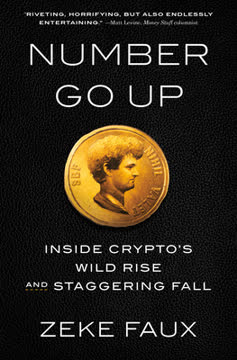Key Takeaways
1. Steve Jobs: A Visionary with a Complicated Legacy
"Steve Jobs was one of the most enduring symbols of his generation, reflecting all of its virtues and failings and self-delusions."
Charismatic innovator. Steve Jobs was a complex figure who revolutionized personal computing, animation, and consumer electronics. His vision and drive led to groundbreaking products that changed the way people interact with technology.
Controversial personality. Despite his achievements, Jobs was known for his mercurial temperament, often berating employees and demanding perfection. His leadership style was both inspiring and intimidating, pushing people to achieve beyond their perceived limits.
Cultural icon. Jobs became a symbol of Silicon Valley entrepreneurship, blending countercultural ideals with capitalist success. His story of founding Apple in a garage, being ousted, and then returning to save the company became legendary in business circles.
2. The Rise, Fall, and Rebirth of Apple
"He had vowed to show that his precocious success at Apple wasn't a fluke, that the board had been wrong to kick him out, that he could launch another great company and once again change the world with a revolutionary machine."
Apple's early success. Jobs co-founded Apple in 1976, leading the company to rapid growth with innovative products like the Apple II and Macintosh. However, conflicts with the board and CEO John Sculley led to his ousting in 1985.
Wilderness years. After leaving Apple, Jobs founded NeXT Computer and acquired Pixar Animation Studios. While NeXT struggled, Pixar's success with "Toy Story" in 1995 made Jobs a billionaire.
Triumphant return. In 1997, Apple acquired NeXT, bringing Jobs back as interim CEO. He streamlined the product line, introduced the iMac, and set Apple on a path to become one of the world's most valuable companies.
3. Pixar: Jobs' Unexpected Path to Hollywood Success
"Pixar failed nine times over by normal standards, but Steve didn't want to fail so he kept writing the checks."
Risky investment. Jobs acquired Pixar from Lucasfilm in 1986 for $10 million, initially focusing on selling high-end graphics computers. The company struggled financially for years.
Pivot to animation. Under the leadership of John Lasseter and with Jobs' backing, Pixar shifted focus to creating computer-animated films. The success of "Toy Story" in 1995 transformed the company's fortunes.
Hollywood power player. Pixar's string of hits, including "A Bug's Life" and "Toy Story 2," established Jobs as a major force in the entertainment industry. The company's success rivaled traditional animation studios like Disney.
4. Jobs' Leadership Style: Inspiring and Demanding
"Steve's brain has an amazing ability to recraft things and put a different spin on them."
Reality distortion field. Jobs was known for his ability to inspire and motivate others, often convincing them to achieve seemingly impossible tasks. This "reality distortion field" was both praised and criticized.
Perfectionism and attention to detail. Jobs demanded excellence in every aspect of product design and development. He was known to reject products at the last minute if they didn't meet his exacting standards.
Controversial methods. His leadership style often involved public criticism and emotional outbursts. While some saw this as necessary for achieving greatness, others viewed it as unnecessarily harsh and demoralizing.
5. The iMac Revolution and Apple's Turnaround
"Steve thought that he could license Pixar's software on everyone's computer so they could make beautiful pictures."
Bold design choices. The iMac, introduced in 1998, marked a turning point for Apple. Its colorful, translucent design and focus on ease of use revitalized the company's image and sales.
Simplified product line. Jobs drastically reduced Apple's product offerings, focusing on a small number of high-quality devices. This strategy helped streamline operations and clarify the company's brand identity.
Return to profitability. Under Jobs' leadership, Apple returned to profitability within a year. The company's stock price rose dramatically, setting the stage for future innovations like the iPod and iPhone.
6. Jobs' Personal Life and Relationships
"At thirty, Steve had a sleek black Porsche and he couldn't help but show it off, like a teenager with a new hot rod."
Complex family dynamics. Jobs' relationship with his daughter Lisa, whom he initially denied paternity of, evolved over time. He later became a devoted father to his children with wife Laurene Powell Jobs.
Friendships and rivalries. Jobs maintained close relationships with figures like Larry Ellison and John Lasseter, but also had famous rivalries, particularly with Microsoft's Bill Gates.
Health struggles. Jobs' battle with pancreatic cancer, which he initially tried to treat with alternative methods, became public knowledge in the later years of his life.
7. The Art of Product Launch and Marketing
"Steve always had a penchant for changing his mind and walking away from good deals because he wanted better terms, and usually that habit was self-destructive."
Theatrical presentations. Jobs was known for his captivating product launches, creating a sense of excitement and anticipation around new Apple products. His presentations became cultural events in themselves.
Brand building. Jobs focused on creating a strong, consistent brand identity for Apple, emphasizing simplicity, creativity, and innovation. This approach extended to Apple's retail stores, which revolutionized tech retail.
Media manipulation. Jobs was skilled at managing media coverage, often playing journalists against each other to maintain control of Apple's narrative.
8. Jobs' Impact on Technology and Popular Culture
"He was a businessman posing as an idealistic revolutionary, striving for social change."
Technological visionary. Jobs' products, from the Macintosh to the iPhone, fundamentally changed how people interact with technology, making complex devices accessible and even desirable to the masses.
Cultural influence. Beyond technology, Jobs became a cultural icon, symbolizing innovation and entrepreneurship. His personal style, from his black turtlenecks to his presentation techniques, was widely imitated.
Legacy. Jobs' impact extended beyond Apple and Pixar, influencing industries from music (iTunes) to telecommunications (iPhone) to retail (Apple Stores). His vision continues to shape technology and design long after his death in 2011.
Last updated:
FAQ
What's The Second Coming of Steve Jobs about?
- Steve Jobs' Journey: The book chronicles Steve Jobs' life after his ousting from Apple in 1985, focusing on his struggles and eventual resurgence in the tech industry.
- Three-act Structure: Jobs' journey is divided into three acts: initial success, struggles with NeXT and Pixar, and his ultimate comeback at Apple.
- Cultural Impact: It examines the broader cultural implications of Jobs' work, illustrating how he shaped the technology and entertainment industries.
Why should I read The Second Coming of Steve Jobs?
- Insight into a Tech Icon: The book provides a deep dive into the complexities of Steve Jobs' character, revealing his motivations and vulnerabilities.
- Lessons on Leadership: Readers can learn about resilience, innovation, and the consequences of ambition through Jobs' experiences.
- Rich Storytelling: Alan Deutschman combines biographical details with engaging anecdotes, making it a compelling read for those interested in business, technology, or personal growth.
What are the key takeaways of The Second Coming of Steve Jobs?
- Resilience and Tenacity: Jobs' ability to bounce back from failures is a central theme, emphasizing persistence and refusal to accept defeat.
- Visionary Leadership: His unique vision for technology and design transformed Apple and Pixar, setting new industry standards.
- Complex Relationships: The book highlights Jobs' tumultuous relationships with colleagues, illustrating how his demanding nature could lead to both loyalty and resentment.
What are the best quotes from The Second Coming of Steve Jobs and what do they mean?
- “Everyone here can leave—except me.”: Reflects Jobs' deep sense of responsibility and commitment to his vision, even when faced with failure.
- “I don’t want to do this interview.”: Captures Jobs' emotional vulnerability, showing that even a tech titan can feel defeated.
- “I’m going to change the world.”: Encapsulates Jobs' ambition and belief in his ability to innovate, highlighting his relentless drive.
How does The Second Coming of Steve Jobs portray Steve Jobs' leadership style?
- Authoritarian Approach: Jobs is described as a mercurial leader who often resorted to intimidation and verbal abuse.
- Charismatic Visionary: Despite his harsh methods, Jobs inspired loyalty and creativity, attracting talented individuals to his vision.
- Dual Nature: His brilliance was often overshadowed by tyrannical behavior, making him both revered and reviled in the tech industry.
What challenges did Steve Jobs face after leaving Apple, as described in The Second Coming of Steve Jobs?
- Struggles with NeXT: Jobs faced significant difficulties with NeXT, which was considered a commercial failure.
- Emotional Turmoil: He experienced depression and self-doubt, questioning his initial success at Apple.
- Public Perception: The media turned against him, portraying him as a has-been, adding to his struggles.
How did Steve Jobs' experience with Pixar differ from his time at NeXT, according to The Second Coming of Steve Jobs?
- Creative Freedom at Pixar: Unlike NeXT, Pixar allowed Jobs to explore his creative vision with a talented team.
- Focus on Storytelling: Pixar's emphasis on narrative and character development resonated with Jobs, leading to the success of Toy Story.
- Financial Struggles: Despite creative successes, Pixar faced financial difficulties, which Jobs navigated by shifting focus from hardware to software.
What was the significance of the Toy Story deal for Steve Jobs and Pixar?
- Turning Point for Pixar: The deal with Disney marked Pixar's transition to a major player in the animation industry.
- Validation of Jobs' Vision: Demonstrated Jobs' ability to merge technology with storytelling, revolutionizing animation.
- Financial Stability: The success of Toy Story provided the financial backing needed for Pixar to thrive and expand.
How did Steve Jobs' leadership style impact his companies, as discussed in The Second Coming of Steve Jobs?
- Duality of Leadership: Jobs inspired and motivated teams but was also known for being demanding and harsh.
- Reality Distortion Field: His charisma often led to a "reality distortion field," compelling employees to meet high expectations.
- Impact on Morale: His focus on perfection drove innovation but also led to high turnover and burnout among employees.
What role did personal relationships play in Steve Jobs' life and career, according to The Second Coming of Steve Jobs?
- Influence of Romantic Partners: Relationships with Tina Redse and Laurene Powell shaped his emotional state and personal growth.
- Family Connections: Reunion with his biological family provided a sense of identity and belonging.
- Friendships and Mentorships: Colleagues and mentors influenced his leadership style and decision-making, highlighting the importance of support networks.
How did Steve Jobs' financial decisions affect his companies, as outlined in The Second Coming of Steve Jobs?
- Investment in NeXT and Pixar: Jobs invested millions, often without a clear path to profitability, leading to financial strain.
- Risky Strategies: His willingness to take risks showcased belief in his ventures but also led to heavy debt.
- Impact on Personal Wealth: Financial decisions diminished his fortune, forcing a reassessment of priorities and strategies.
What lessons can entrepreneurs learn from Steve Jobs' journey in The Second Coming of Steve Jobs?
- Embrace Failure as a Teacher: Jobs' experiences illustrate that setbacks can provide valuable lessons and lead to success.
- Vision and Passion Matter: A clear vision and ability to inspire others are crucial for driving innovation and achieving goals.
- Balance Perfectionism and Pragmatism: Striving for excellence is important, but understanding market realities and adaptability are vital for long-term success.
Review Summary
The Second Coming of Steve Jobs received mixed reviews, with an average rating of 3.96 out of 5. Readers appreciated the insights into Jobs' personality, leadership style, and Apple's history. Many found it inspiring and well-researched, praising its portrayal of Jobs' charisma and vision. However, some criticized the book's organization and bias. Readers noted Jobs' controversial personality, including his perfectionism and sometimes difficult behavior. The book covers Jobs' career from his departure from Apple through his return, ending before the iPod's introduction.
Similar Books










Download PDF
Download EPUB
.epub digital book format is ideal for reading ebooks on phones, tablets, and e-readers.




